|
|
|
Sort Order |
|
|
|
Items / Page
|
|
|
|
|
|
|
| Srl | Item |
| 1 |
ID:
145643
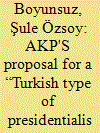

|
|
|
|
|
| Summary/Abstract |
President Recep T. Erdoğan and the Justice and Development Party have proposed a presidential system with a very strong single executive with very little or no constitutional constraints, called “the Turkish Type of Presidential System.” They campaigned for it from 2013 through the 2015 parliamentary election. Even though this proposal has not been enacted, it has shaped Turkish politics considerably by generating strong opposition as well as stalwart defenders. This article examines the constitutional institutions of the proposed presidential model, compares it with other known examples of presidential systems, and argues that it is a form of hyper-presidentialism.
|
|
|
|
|
|
|
|
|
|
|
|
|
|
|
|
| 2 |
ID:
171873
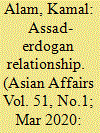

|
|
|
|
|
| Summary/Abstract |
Much has been made of the once brotherly relationship between Syrian President Bashar al Assad and the Turkish President Recep Teyep Erdogan. Indeed, this relationship formed the bedrock of Turkey's much-vaunted move towards the Arab world and its re-engagement with regions on which Ataturk and his successive Kemalist Generals had shut a door. Yet, more than fifteen years after the historic first visits by the Turkish and Syrian leaders to each other's capitals, the Syria-Turkey relationship lies in ruins. Whilst much of the focus of the war in Syria has been on the exaggerated sectarian divide in the Middle East and the great power rivalry between the United States and Russia, a key aspect overlooked is the fundamental relationship between Turkey and Syria. The last two decades of this relationship have been defined by Assad and Erdogan. As Turkey slowly begins to re-engage with Syria one can trace the tumultuous relationship between the two neighbours in the immediate aftermath of the dissolution of the Ottoman Empire. The Arab nationalists and Turkish nationalists have been at daggers drawn over the make up of the border. Syria has never forgotten the land-grab of the Turks in the aftermath of the French exit of the Levant. Furthermore, the diverse set of communities – the Greeks, the Armenians, the Kurds and the Syriacs – that make up the inhabitants of the region still suffer from the effects of the mismanagement of the French exit and what is seen by many of these communities as an illegal annexation by Turks and Arabs. However, under the Syrian Arab Republic the Christians of all denominations including the Armenians and Greeks flourished whilst Turkey forced only one identity upon its once diverse people. This article will argue that the relationship between Syria and Turkey has ebbed and flowed – and this dynamic is rooted in history where successive Turkic dynasties have favoured Syria as their pivot to control the region. Similarly, when Syria became less important, the very foundation of the Turkic and later Turkish influence became weak in the region. The close relationship between Erdogan and Assad overturned more than six decades of animosity, but once Erdogan turned his back to Assad and supported the overthrow of the Syrian government the relationship fell apart. As the end of the war nears, a defining factor to end this war will be how Turkey and Syria reconcile or interact. The Syrian Kurds now seem to be back in Assad's corner as they prefer to be under Damascus' sovereignty then under attack from Ankara across the border. The Kurdish question is of significant value to both Syria and Turkey; it has been a major reason for both countries to be at peace and war. A closer look at the history of these two countries' relationship proves that the Assad-Erdogan relationship has mirrored the history of the two states since the fall of the Ottoman Empire. Their future in more than one way is now inter-twined on how they interact with each other.
|
|
|
|
|
|
|
|
|
|
|
|
|
|
|
|
| 3 |
ID:
134010
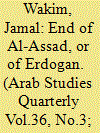

|
|
|
|
|
| Publication |
2014.
|
| Summary/Abstract |
In this article, I argue that Turkish Prime Minister Recep Tayyip Erdogan wanted to improve relations with Syria because he wanted Turkey to play a leading role in the Arab world. This role is promoted by the United States which aims at creating an alliance between Turkey and the Arab states to block Russia, China, and Iran from having access to the East Mediterranean or the Indian Ocean. Turkey's reward would be to have access to Arab markets and oil. Syrian President Bashar al-Assad was tempted by the United States, Turkey, and conservative Arab regimes to sever his ties with Iran, which he refused to do. Therefore, the former powers supported the Syrian uprising (which started as domestic protests against dictatorship, corruption, and misrule) to topple al-Assad. However, two and half years since the Syrian uprising started, the al-Assad regime seems to be resisting the attempts of his opponents to topple it, which would mean a failure of Erdogan in his political bet and might even lead to his downfall, especially after the eruption of protests against Erdogan throughout Turkey in early June 2013.
|
|
|
|
|
|
|
|
|
|
|
|
|
|
|
|
| 4 |
ID:
145576
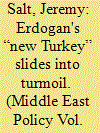

|
|
|
| 5 |
ID:
171190
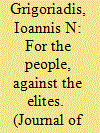

|
|
|
|
|
| Summary/Abstract |
While the rise of populism has been a global trend in recent years, it has been prevalent in Greece and Turkey for longer, leaving a strong imprint on the politics of both countries. Left-wing populism has become one of the constitutive elements of the Greek political party system since the collapse of the 1967–1974 military regime. The 2009 outbreak of the Greek economic crisis set the stage for the radicalization of Greek politics through the rise of extremist far-right and far-left populist parties that professed populist agendas of different hues. Such populists accused old-party personnel of being members of a “treacherous elite” that sacrificed Greek national interests against foreign powers. The 2011 “indignados” movement is key for the better understanding of the social dynamics that facilitated the rise of the unusual SYRIZA-ANEL coalition government. Debates on Greek constitutional reform also highlighted the relevance of populism, especially as the SYRIZA-ANEL government sought topics to resonate with its disenchanted voters. On the other hand, a right-wing populist rhetoric has been one of the key instruments for the rise of Turkish political Islam and the establishment of the AKP hegemony in Turkey. Establishing a Kulturkampf-based narrative about the “secularist, ‘white-Turk’ elites” versus the “conservative, ‘black-Turk’ people” was of great political significance. The constitutional reform process proved again crucial for manifesting the relevance of populism in Turkish political discourse. This article explores the circumstances under which left- and right-wing populism have emerged into a dominant feature of Greek and Turkish politics. It also discusses the decreasing relevance of the established left-right political divide in party politics and suggests alternative classifications.
|
|
|
|
|
|
|
|
|
|
|
|
|
|
|
|
| 6 |
ID:
145638


|
|
|
|
|
| Summary/Abstract |
Turkish politics is complex and, at times, comes close to being bizarre. When the Justice and Development Party (Adalet ve Kalkınma Partisi [AKP]) came to power it embarked on ambitious economic and political reforms that at last promised to bring embedded democracy to Turkey. Yet, since 2007, most of the initial reforms have regressed, deepening societal cleavages that threaten the stability of the country, and a popularly elected president threatens to change the parliamentary democratic system with an autocratic presidential order. While the AKP can celebrate in its unprecedented four election victories since 2002, its recent actions should give concern to anyone who cares about the future of Turkey.
|
|
|
|
|
|
|
|
|
|
|
|
|
|
|
|
| 7 |
ID:
118886
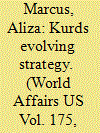

|
|
|
| 8 |
ID:
120752


|
|
|
|
|
| Publication |
2013.
|
| Summary/Abstract |
Leaders are influential in Turkish politics; since early Republican years under Atatürk and Inönü, the dominance of omnipotent leaders continued, if not escalated, under democratic elections. Menderes or Demirel or Erbakan, and presently Erdogan, each leader assumed office with different personal and political backgrounds, worldviews, and personality characteristics. Nonetheless, a systematic study of political leaders in Turkish politics and foreign policy has rarely been a concern to scholars of Turkey. This lack of attention to Turkey's political leaders affects not only a nuanced understanding of its domestic politics but also its foreign policy. How do Turkish leaders' idiosyncratic traits affect their politics? How does the common phrase "secular and religious leaders" capture differences among Turkey's leadership? Utilizing a method of leadership assessment at-a-distance, this piece provides answers to such questions with respect to foreign policy profiles of all post-Cold War prime ministers of Turkey. It illustrates that Turkish leaders have distinct leadership traits but cannot be reduced to "seculars" and "Islamists."
|
|
|
|
|
|
|
|
|
|
|
|
|
|
|
|
| 9 |
ID:
163641
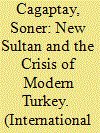

|
|
|
|
|
| Summary/Abstract |
Turkey’s deep societal polarisation is a direct result of Recep Tayyip Erdogan’s political trajectory. Prime minister of Turkey since 2003 and president since 2014, Erdogan has become the most unassailable Turkish leader since Mustafa Kemal Ataturk established modern Turkey in 1923 out of the ashes of the Ottoman Empire. A prototype of populist leaders globally, Erdogan has demonised and brutalised demographics that are not likely to vote for him, including leftists and liberals. Erdogan’s populism has helped him built a loyal base composed mostly of conservatives, many of whom he has lifted out of poverty. Accordingly, Turkey is split nearly in the middle: half the country adores him, while the other half loathes him. But, Erdogan wants to shape all of Turkey, including those that loathe him, in his own image, using his power to funnel state resources towards top-down social engineering. To this end, he has decided to push ahead, declaring himself omnipotent president. Half of Turkey though will never embrace Erdogan’s agenda and this will exacerbate Turkey’s deep political crisis.
|
|
|
|
|
|
|
|
|
|
|
|
|
|
|
|
| 10 |
ID:
140595


|
|
|
|
|
| Summary/Abstract |
RUSSIAN-TURKISH diplomatic relations marked their 95th anniversary on June 3, 2015. Russia and Turkey, each of which is situated partially in Europe and partially in Asia and possesses a rich cultural and historical heritage, are, in a sense, bridges between East and West.
|
|
|
|
|
|
|
|
|
|
|
|
|
|
|
|
| 11 |
ID:
178032


|
|
|
|
|
| Summary/Abstract |
This article analyzes the increased visibility and frequency of public weeping by the Turkish president, Recep Tayyip Erdoğan. Building on the literature that conceptualizes populism as a particular political style, I argue that crying in public can be understood as a populist performative act of legitimation, serving to dramatize the basic components of the populist discourse. I also contend that the increased frequency of public weeping by Erdoğan relate to two major dilemmas that populists in power encounter. Both dilemmas stem from the growing discrepancy between populist rhetoric and practice, diminishing the credibility of the populist leader. Signaling emotional authenticity, Erdoğan’s tearfulness serves to communicate a message of closeness to the people and sustain the anti-elite rhetoric at a time when his political power and economic wealth increasingly set him apart from the politically and economically marginalized. It also attempts to justify authoritarian practices while sustaining the claim to rule in the name of popular power and mobilize constituents against the opposition.
|
|
|
|
|
|
|
|
|
|
|
|
|
|
|
|
| 12 |
ID:
171946


|
|
|
|
|
| Summary/Abstract |
Since the coup attempt of 2016, bilateral ties between Ankara and Tehran have witnessed a significant boost. Using and refining Steven David’s framework of omni-balancing, which argues that the conduct of foreign policy in Third World settings also takes stock of domestic threats to the regime, this paper explains this emerging rapprochement. The article argues that after 2016, the AKP’s foreign policy became increasingly predicated on regime survival, which was also reflected in Ankara-Tehran ties. This rapprochement was strengthened by both countries’ intersecting positions on the following issues (1) A mutual pro-Qatar stance in the recent Saudi Arabia-Qatar spat, (2) Mutual opposition to a Kurdish state in northern Iraq, and (3) Increasingly troubled relations with the US. Through a careful analysis of Turkish and Persian sources along with official discourses, this paper will expand on these key aspects of these significantly improved bilateral relations between both countries and will conclude with discussion of its durability.
|
|
|
|
|
|
|
|
|
|
|
|
|
|
|
|
| 13 |
ID:
115030
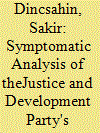

|
|
|
|
|
| Publication |
2012.
|
| Summary/Abstract |
This article focuses on the populist strategy of the Turkish Justice and Development Party between the 2007 presidential election, when Turkish politics experienced an impasse, and the 2010 referendum over the constitutional amendments. As a means of analysing populism, the symptomatic approach is preferred over other theoretical perspectives, including empiricism and historicism. An analysis of the discourse articulated by Prime Minister Erdogan leads us to the conclusion that he has continually appealed to the masses with an anti-institutional rhetoric that divides society into 'the people' and 'the elite', thereby fulfilling the criteria of populism according to the symptomatic approach.
|
|
|
|
|
|
|
|
|
|
|
|
|
|
|
|
| 14 |
ID:
152030


|
|
|
|
|
| Summary/Abstract |
The 15th July coup attempt in Turkey has added another layer of complexity to the conundrum that is Turkish politics. Since the coup attempt there have been several DAESH and PKK attacks in Turkey, including the assassination of the Russian Ambassador. The country continues to wage war with both terror organizations, whilst trying to pass a new constitution. In this whirlwind of history, many of the questions that lie at the heart of the coup attempt seem sidelined. There have been waves of purges since July, and it is believed that the high number of terror attacks are linked to a weakened intelligence establishment. The following essay attempts to give a brief description of the Gülen movement which, according to several testimonies, was behind the coup attempt. It tries to explain the political structures in Turkey that have always been wedded to military power, and that led to a supposedly religious organization gain so much power. It also tries to sketch a history Turkish people's reactions to military coups and how and why 15th July was different.
|
|
|
|
|
|
|
|
|
|
|
|
|
|
|
|
| 15 |
ID:
153459
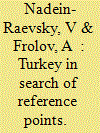

|
|
|
|
|
| Summary/Abstract |
A. Frolov: Having left the deplorable crisis behind, Russia and Turkey added positive energy to their bilateral relations even though unanimity on certain issues is impossible for objective reasons. For obvious reasons, these relations should be discussed in the context of the deep-cutting political and social transformations unfolding inside the Turkish society, the root of the current ups and downs of Turkish politics.
|
|
|
|
|
|
|
|
|
|
|
|
|
|
|
|
| 16 |
ID:
170449


|
|
|
|
|
| Summary/Abstract |
There have been significant changes in Turkish foreign policy under President Recep Tayyip Erdogan, in particular since the 2016 military coup attempt. The changes have resulted in a strong focus on national security, an assertive style in policy implementation, a preference for transaction-based relations, and a quest for more strategic autonomy. Two main arguments are made: First, these features of policy represent both change and continuity when compared with earlier periods in Turkish foreign policy. The novelty under Erdogan is primarily in how the features are combined. Second, the changes do not represent a shift in Turkey’s overall international orientation.
|
|
|
|
|
|
|
|
|
|
|
|
|
|
|
|
|
|
|
|
|